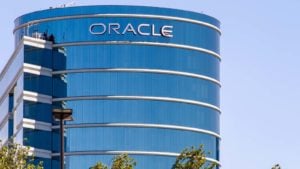Along with most other stocks since late February, Oracle (NYSE:ORCL) has been on bearish path. Note that the shares have gone from $55 to $39.80. But today, there was a nice change in direction: ORCL stock is up 14% to $45.

This is due to a combination of a snap back in the market as well as a solid earnings report. For the fiscal third quarter, revenues grew by 2% to $9.8 billion and the adjusted earnings came to 97 cents a share. As for the Street, the consensus estimate was for $9.75 billion on the top line and 96 cents a share for the profits.
Actually, the quarterly growth in revenue was the highest in two years.
Here are some of the other highlights for the quarter:
- Among a group of 16 companies, Oracle ranked as a leader for Gartner’s 2019 “Magic Quadrant for Manufacturing Execution Systems.” This was based on the vision and ability to execute with its cloud platform.
- Oracle announced the general availability of its Cloud Data Science Platform. This technology helps enterprises with training, managing and deploying sophisticated AI (Artificial Intelligence) projects. This is all backed up with the kinds of things businesses look for like audits, security and model catalogs.
- Oracle has continued with its aggressive expansion of its cloud infrastructure. In the quarter, the company added local regions in Saudi Arabia (Jeddah), Australia (Melbourne), Japan (Osaka), Canada (Montreal) and The Netherlands (Amsterdam). The goal is to have 36 cloud regions by the end of this year.
- Oracle and Microsoft (NASDAQ:MSFT) bolstered their collaboration alliance by establishing a new interconnect location in Amsterdam, which is a strategic location for regions in Europe.
- There are plans to layoff up to 1,300 employees in Europe. This is part of a plan to streamline the cloud business.
- The Oracle Cloud Applications has been certified for FedRAMP Moderate Authorization. This is a key part of being more competitive in getting federal contracts.
In the quarter, the main driver was the cloud business, which saw overall growth of 5%. Keep in mind that this segment now accounts for 71% of total revenues.
The company has also been bolstering its core database business. After all, Oracle has had to fend off fast-growing startups like Mongodb (NASDAQ:MDB). There is also more competition for mature operators like MSFT and SAP (NYSE:SAP).
So a key part of Oracle’s strategy is its Autonomous Database. As the name implies, the system handles tasks like security patches automatically. There is also much flexibility with modern environments by being serverless and elastic.
On the earnings call, here’s what Oracle CTO and chairman Larry Ellison had to say: “We have an enormous technology advantage with our Autonomous Database. And we expect our database growth rates to accelerate from that 5% number we experienced this past quarter as customers transition from legacy databases to the Autonomous Database in the cloud.”
Bottom Line on ORCL Stock
Then how will the likely downturn in the economy impact ORCL stock? Well, for the most part, the company’s revenue base is likely to hold up very well. Oracle has the benefit of highly sticky applications for strategic areas like databases, middleware and ERP. Such technologies are not discretionary for customers.
And as a sign of confidence, Oracle has announced a $15 billion buyback. In fact, the company has been a big buyer for quite some time. For the past five years, there has been a 28% reduction in the share count.
Thus, for investors looking for a bargain in the tech sector — and where the yield is a respectable 2.4% — Oracle does look like a good choice right now.
Tom Taulli (@ttaulli) is the author of various books on investing and technology, including Artificial Intelligence Basics, High-Profit IPO Strategies and All About Short Selling. He is also the founder of WebIPO, which was one of the first platforms for public offerings during the 1990s. As of this writing, he did not hold a position in any of the aforementioned securities.
